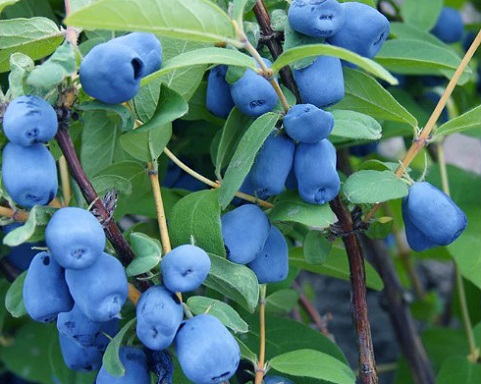Canadian Study Finds That Haskap Berries May Help Reduce Lung Cancer Risks Among Smokers
Nikhil Prasad Fact checked by:Thailand Medical News Team Dec 04, 2024 4 months, 1 week, 2 days, 14 hours, 29 minutes ago
Medical News: A groundbreaking study highlights the potential of anthocyanin-rich haskap berries (HB) in mitigating the risks of lung cancer associated with smoking. Researchers from Dalhousie University and the Beatrice Hunter Cancer Research Institute in Canada have explored how haskap berries (HB) supplementation impacts the harmful effects of 4-(methylnitrosamino)-1-(3-pyridyl)-1-butanone (NNK), a cancer-causing compound found in tobacco smoke. This
Medical News report reveals their findings, shedding light on a promising natural approach to reducing lung cancer risks.
 Canadian Study Finds That Haskap Berries May Help Reduce Lung Cancer Risks Among Smokers
The Role of Cytochrome P450 and NNK in Cancer Development
Canadian Study Finds That Haskap Berries May Help Reduce Lung Cancer Risks Among Smokers
The Role of Cytochrome P450 and NNK in Cancer Development
NNK is metabolically activated in the body by enzymes in the cytochrome P450 (P450) family, particularly CYP2A13 in human lungs. This activation results in the production of reactive metabolites that cause DNA damage and initiate lung carcinogenesis. The study investigated how haskap berries, rich in anthocyanins like cyanidin-3-O-glucoside (C3G), can modulate these P450 enzymes to prevent the harmful effects of NNK.
Study Overview and Methodology
Conducted on mice, the study tested the effects of haskap berries supplementation at a dose equivalent to 6 mg of C3G per mouse per day. Researchers divided the mice into four groups:
-A control group receiving no HB or NNK.
-A group exposed only to NNK.
-A group pre-fed with HB and then exposed to NNK.
-A group given HB before and after NNK exposure.
The researchers analyzed liver tissue for the expression of P450 enzymes and inflammatory markers. They also examined how haskap berries influenced the formation of harmful and non-harmful NNK metabolites in the body.
Key Findings From the Study
-Suppression of Carcinogen Activation: Haskap berries supplementation significantly reduced the expression of two key P450 enzymes, cyp2a4 and cyp2a5, in the liver of mice exposed to NNK. This suppression was most pronounced when haskap berries was provided both before and after NNK exposure. The reduction in P450 activity limits the formation of carcinogenic NNK metabolites.
-Enhanced Production of Non-Harmful Metabolites: Haskap berries-fed mice showed higher levels of NNAL, a less reactive and non-carcinogenic metabolite of NNK, suggesting that haskap berries helps redirect NNK metabolism towards safer pathways.
-Influence on Inflammatory Pathways: Haskap Berries supplementation modulated inflammation by altering the expression of key cytokines like TNF-alpha and IL-6. While inflammation is often linked to cancer progression, the exact role of these changes in this context remains a subject of further research.
-Molecular Insights: Molecular docking studies revealed that anthocyanins in haskap berries, particul
arly C3G and its metabolites, bind strongly to CYP2A13. This interaction could inhibit the enzyme's ability to activate NNK, providing a molecular basis for the observed protective effects.
Why These Findings Matter
This study underscores the potential of dietary interventions in cancer prevention. Haskap berries, rich in natural compounds, offer a promising, accessible way to reduce the health risks associated with smoking. While further research in humans is necessary, these findings lay the groundwork for developing new dietary recommendations or supplements targeting lung cancer prevention.
Limitations and Future Directions
Although the findings are promising, the study was conducted in mice, and human trials are essential to confirm the effects. Additionally, the researchers noted that the mechanisms behind the interaction of haskap berries compounds with P450 enzymes require further exploration.
Conclusion
Haskap berries demonstrate significant potential in reducing lung cancer risks associated with smoking by inhibiting the activation of harmful carcinogens and modulating inflammatory pathways. The dual approach of reducing harmful metabolites and increasing non-toxic ones showcases a natural, food-based strategy for cancer prevention. Future studies should focus on translating these findings to human populations and identifying the best ways to incorporate HB into everyday diets.
The study findings were published in the peer-reviewed journal: Pharmaceuticals.
https://www.mdpi.com/1424-8247/17/12/1615
For the latest on Herbs And Phytochemicals, keep on logging to Thailand
Medical News.
Read Also:
https://www.thailandmedical.news/news/thailand-medical-study-reveals-purple-waxy-corn-tassel-extract-protects-lungs-from-air-pollution-induced-inflammation
https://www.thailandmedical.news/news/study-shows-that-anthocyanins-have-powerful-anticancer-and-anti-inflammatory-properties
https://www.thailandmedical.news/news/herbs-and-phytochemicals-ocimum-gratissimum-extracts-show-promise-in-the-fight-against-lung-cancer
